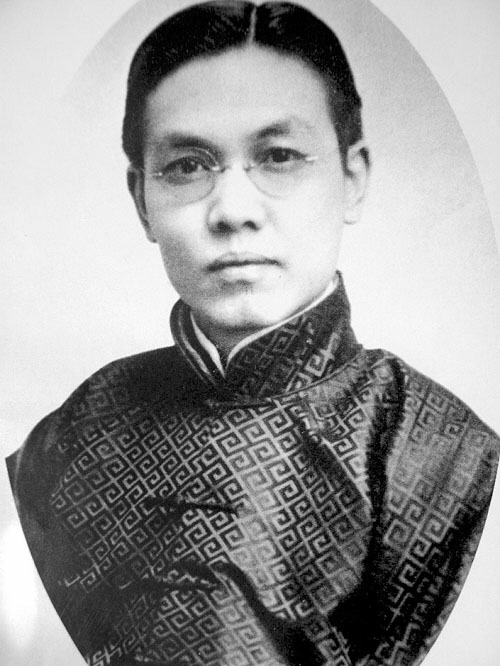News & Events | About PKU News | Contact | Site Search
PKU Today in History - a daily column featuring historic events regarding PKU and PKUers.
Peking University, Apr. 26, 2011: Four score and five years ago, a journalist was killed. Unlike Tim Hetherington or Chris Hondros who lost their lives in the midst of the battle for Libya, the former PKU faculty member — Shao Piaoping — was killed in a Beijing execution ground.
Shao Piaoping, born on October 11, 1886, was a Chinese journalist, writer, and political activist, who also pioneered journalistic education in China.

Shao Piaoping (1886-1926) (File photo/Xinhua)
A native of Dongyang in east China’s Zhejiang province, Shao spent most of his life pursuing his aspirations for journalism.
In 1902, he entered the Zhejiang Advanced College in Hangzhou. After his graduation, he worked as a teacher in the Jinhua Secondary School. In 1911, he launched the newspaper Hanmin Daily and became the chief editor. Because of his objection to Yuan Shikai, China’s then-leader, Shao was arrested by warlords on three occasions, and eventually fled to Japan in 1914. He established the "Tokyo Editing Society" and became the Tokyo correspondent for Shenbao.
In 1916, he returned to China and stayed in Beijing. During this period, he was working as the Beijing correspondent of Shenbao. He wrote 251 articles to considerable acclaim. In July 1916, Shao set up the first Chinese News Editing Society in Beijing, which focused on independent local news and translations of foreign publications.
In 1918, he published Jingbao (The Peking News), the first independent newspaper in China. In the same year, Shao set up the Peking University Journalism Study Society for indoctrinating modern journalism to the youth, together with Cai Yuanpei and Xu Baohuang, which marked the start of Chinese journalistic research and education.
In 1919, Shao was arrested by the authorities, for criticising the government of Duan Qirui, before fleeing to Japan once more. Simultaneously, Jingbao was put under suspension; the government had grown tired of its criticism. In Japan, he worked as the Chinese advisor of Asahi News. His two famous writings A General Study of Sociological Ideologies in Other Countries and Study of the New Russia were also completed during his stay in Japan, which presented the theory of socialism, glorified Russia’s 1917 October Revolution and sowed the seeds of communism. When the operation of Jingbao was restarted in 1920 after Shao's return to China, Shao published the article "Study of the New Russia."
After 1923, he worked as a lecturer at Beijing Civilian University and National University of Political Science and Law on news gathering. He also published the books Practical Applied Journalism and The Journalism Pandect, which focused on the discipline of journalism and promotion of social justice and political renewal. In 1925, he confidentially joined the Communist party. He supported the National Revolution led by Sun Yat-sen. During the May Fourth Movement in 1919, Shao also helped rally the support for Chinese students protesting against foreign aggression and corruption.
Shao was offended by contemporary warlord government for his constant criticism. He was charged for "promoting communism and colluding with Russia" by the north-eastern warlord Zhang Zuolin. Shao was arrested by military officials and executed in Beijing on April 26, 1926 at the age of 40.
"To die as a journalist" was his lifetime motto. Shao contributed to the development of the Chinese journalism through efforts such as founding the influential newspaper, Jingbao. He also entangled politics with his journalistic career with his criticisms against the government. Shao Piaoping was the pioneering journalism educator and practitioner in the early 20th century China. His contributions include reforming the style and practice of newspaper; combating censorship; and setting a standard for journalistic practice. He was one of the most influential personages in the history of Chinese journalism.
Xinjingbao (literally "new jingbao"), or the Beijing News, was launched in 2003.
“Time has truly begun! History has truly begun!” said Editor-in-Chief Cheng Yizhong during its inauguration ceremony.
The foreword of the Beijing News read: 85 years ago, Shao Piaoping inaugurated Jingbao.
Another four score and five years.
Extended Reading:
Scholar-journalists of the May Fourth Era: Forging a New Sensibility and a New Professional Identity
Written by: Chen Wei
Edited by: Jacques
Source: PKU News (Chinese)